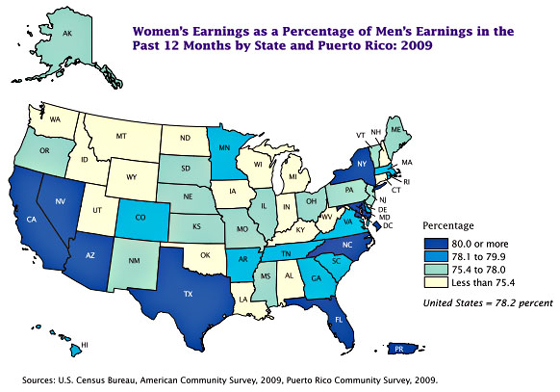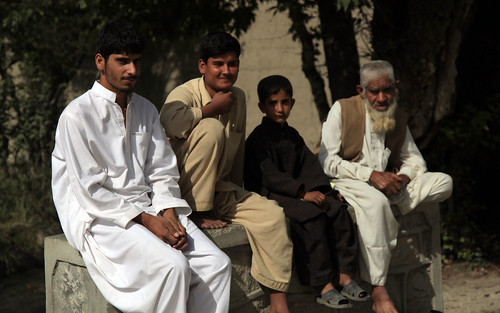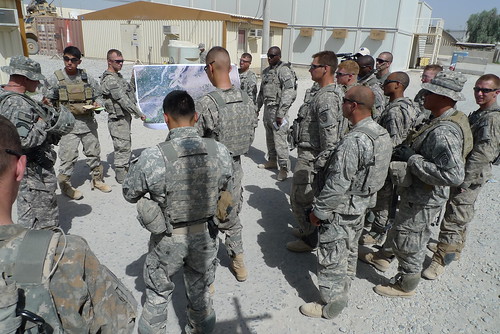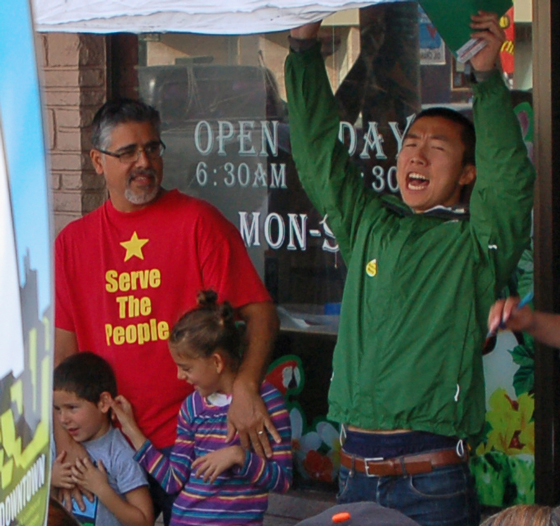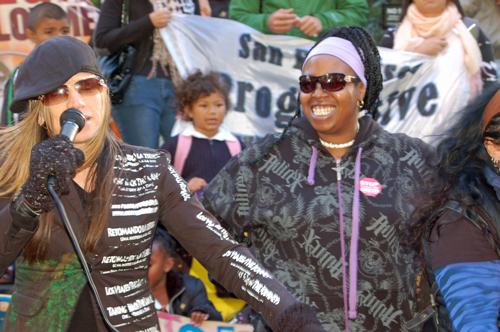 This is important. When the government conducts raids in order to seize personal information from anti-war activists, all of us need to take notice. Under our system, everyone enjoys a Constitutional right to express their opinions. United States courts have long agreed that pretty much any speech that doesn't lead to violence is protected under the law. Raids like these attack free expression by groups who may be unpopular at a particular time -- the peace organization with which I work issued this statement this afternoon.
This is important. When the government conducts raids in order to seize personal information from anti-war activists, all of us need to take notice. Under our system, everyone enjoys a Constitutional right to express their opinions. United States courts have long agreed that pretty much any speech that doesn't lead to violence is protected under the law. Raids like these attack free expression by groups who may be unpopular at a particular time -- the peace organization with which I work issued this statement this afternoon.by Lynn Koh for
War Times/Tiempo de GuerrasBy now, most War Times/Tiempo de Guerras readers have heard of the September 24th FBI raids on peace activists' homes in Minneapolis and Chicago and at the Minneapolis office of the Twin Cities Anti-War Committee. We add our voices to the rest of the progressive movement, and all those who value democracy, in denouncing these raids. We believe that the peace movement must support the folks who have been targeted for their antiwar work.
Plans for solidarity demonstrations are developing quickly. The Anti-War Committee has called for a demonstration at 4:30 p.m. on Monday, September 27, 2010 at the Minneapolis offices of the FBI, 111 Washington Street, South.
Click here for more information. We encourage War Times readers to call U.S. Attorney General Eric Holder at 202-353-1555 and to send emails to the Department of Justice at AskDOJ@usdoj.gov. Ask Attorney General Holder to put an end to the FBI’s attacks on peace activists.
What do we know about these raids? On Friday, September 24th the FBI raided at least six homes in Chicago and Minneapolis, with the explanation that peace activists were providing “material support to foreign terrorist organizations,” namely the FARC in Colombia, the Peoples Front for the Liberation of Palestine, and Hezbollah. The FBI also raided the office of the
Anti-War Committee in Minneapolis, which had organized a demonstration during the 2008 Republican National Convention. Some of the peace activists whose houses were raided are members of the Anti-War Committee. The
New York Times quotes an FBI spokesperson who said the raids were part of “an ongoing Joint Terrorism Task Force investigation.”
While no arrests have been made so far, the activists have been served with grand jury subpoenas.
The raids appear to be 'fishing expeditions' -- attempts to gather as much personal information as possible from the activists’ homes in the hopes of bringing some charges against them. The search warrant which we have seen authorizes the federal agents to seize all documents and records related to any activities in the US or overseas, especially those related to the FARC, PFLP, and Hezbollah, as well as emails, phone records, and internet usage; it also asks for information pertaining to the activists' work in a left group called Freedom Road Socialist Organization.
While many of the communities we work with live with state violence on a daily basis, we believe these events to be of signal importance to the antiwar movement. In the post-9/11 political landscape, War Times/Tiempo de Guerras has striven to bring an internationalist perspective to the antiwar movement, a perspective which focuses not only on the domestic costs and victims of war, but also on the suffering war and occupation bring to peoples around the world. We believe this perspective is essential to achieving a U.S. foreign policy based on justice and solidarity rather than on either domination or isolationism.
The FBI raids occur months after a 6-3 Supreme Court decision upholding a broad interpretation of 'material support to foreign terrorist organizations', whereby offering advice, training, and service to a designated terrorist organization constitutes material support for terrorism -- even if the service in question has nothing to do with any 'terrorist' act. In this context, Friday’s FBI raids contribute to the criminalization of any communication with any group the U.S. State Department has designated a terrorist organization. Even advocating negotiating with one of these named groups may become a crime, not to mention deeper attempts to build solidarity with groups struggling against war and occupation. (It should be noted, for example, that Hezbollah forms part of the democratically elected government of Lebanon.) These raids, and the policy that underlies them, strike directly at the internationalist perspective that grounds all of War Times/Tiempo de Guerras’ work.
War Times has been a multigenerational project from its inception in 2001, and several of our members lived through periods of heightened government repression. These new FBI raids bring those experiences to mind, not least because of the deliberate and comprehensive targeting of Freedom Road Socialist Organization. The warrant authorizing the search of one peace activists’ home instructs government agents to look for any materials related to the recruitment and political education activities -- referred to somewhat quaintly as 'indoctrination' -- of Freedom Road Socialist Organization.
Perhaps we shouldn’t be surprised to see a resurgence of FBI raids and grand jury subpoenas focused on today’s peace activists. This kind of red-baiting and demonization of the Left have a long history in the United States. These tactics have served U.S. government efforts to undermine many social movements, from workers' rights to civil rights. The best known examples include the machinations of FBI director J. Edgar Hoover against Bayard Rustin, Stanley Levison, and the entire leadership of the southern civil rights movement. Such methods are also familiar to people who worked in solidarity with Central American peoples fighting dictatorship and U.S. intervention during the 1980’s, and in the anti-apartheid movement in the 1990’s.
So these tactics of intimidation are familiar. But that doesn’t mean we can ignore them. Unless we challenge the legitimacy of the FBI's raids now -- loudly, visibly, and in as many ways as possible -- the anti-war movement may be facing a more dangerous and difficult road than we had imagined.
What you can do:
• Call the Attorney General’s office and demand an end to political intimidation
• Call or write the “newspapers of record” such as the New York Times and Washington Post, asking them to give full and prominent coverage to this story.
• Write a letter to the editor of your local paper, explaining why this kind of intimidation is a danger to democracy.
• Call your local members of Congress to demand that the FBI stop harassing peace activists.
• Participate in any local actions to protest these raids.




